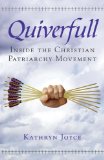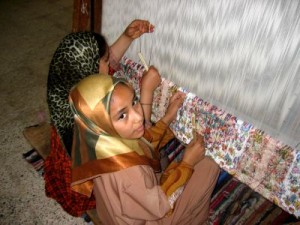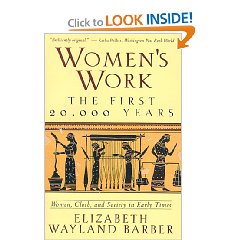 Conservative and fundamentalist Christians of the extreme kind are getting some press right now. It’s due to Kathryn Joyce’s new book Quiverfull: Inside the Christian Patriarchy Movement. Articles by Kathryn or reviews of her book have appeared on NPR, Mother Jones, Salon, Religion Dispatches, Feministing, Feminste, Pandagon, and Emerging Women. Members of the Quiverfull movement are biblical literalists who believe families should have as many children as God gives to them. (The name quiverfull comes from Psalm 127:3-5: “Sons are indeed a heritage from the Lord, the fruit of the womb a reward. Like arrows in the hand of a warrior are the sons of one’s youth. Happy is the man who has his quiver full of them.”) They do not use artificial birth control, and have families as large as 20. They homeschool their children. There are strict gender roles: men work and the public square is their place. Women are to be homemakers and mothers. Their sphere is to be in the home. And of course, wives are to be totally submissive to their husbands. The husbands are the high priests and heads of their homes. Their wives must always defer to them. In the May/April issue of Mother Jones, Kathryn Joyce’s “The Purpose-Driven Wife” discusses another fundamentalist group (not part of the Quiverfull Movement) that gives the classic complementarian view of a submissive wife and mother:
Conservative and fundamentalist Christians of the extreme kind are getting some press right now. It’s due to Kathryn Joyce’s new book Quiverfull: Inside the Christian Patriarchy Movement. Articles by Kathryn or reviews of her book have appeared on NPR, Mother Jones, Salon, Religion Dispatches, Feministing, Feminste, Pandagon, and Emerging Women. Members of the Quiverfull movement are biblical literalists who believe families should have as many children as God gives to them. (The name quiverfull comes from Psalm 127:3-5: “Sons are indeed a heritage from the Lord, the fruit of the womb a reward. Like arrows in the hand of a warrior are the sons of one’s youth. Happy is the man who has his quiver full of them.”) They do not use artificial birth control, and have families as large as 20. They homeschool their children. There are strict gender roles: men work and the public square is their place. Women are to be homemakers and mothers. Their sphere is to be in the home. And of course, wives are to be totally submissive to their husbands. The husbands are the high priests and heads of their homes. Their wives must always defer to them. In the May/April issue of Mother Jones, Kathryn Joyce’s “The Purpose-Driven Wife” discusses another fundamentalist group (not part of the Quiverfull Movement) that gives the classic complementarian view of a submissive wife and mother:
[The wife’s] priorities may include rising early to feed the family, being available anytime to satisfy a husband’s desires (barring a few “ungodly” or “homosexual” acts), seeking his approval regarding work, appearance, and leisure, and accepting that he has the “burden” of final say in arguments. After a wife has respectfully appealed her spouse’s decision-a privilege she should not abuse-she must accept his final answer as “God’s will for her at that time,” Peace advises. The godly wife must also suppress selfish desires (for romance, a career, an equitable marriage), practice addressing her spouse in soothing tones, and maintain a private log of bitter thoughts to guide her repentance. “If you disobey your husband,” Peace admonishes in The Excellent Wife, “you are indirectly shaking your fist at God.”
According to them the Bible says so. Actually the Bible says so in three verses out of the entire canon. Twice in Paul’s letters and once in 1 Peter we read that wives are to submit to their husbands. But we see a different picture when we read about the women in the Bible. They did not submit in all things to their husbands. In fact some of them defied their husbands and did what was best for their families and households. It was a very good thing that Abigail did not submit in all things to her husband, Nabal. If she had she would have been slaughtered. Her story is found 1 Samuel 25.
A Decisive Woman
Abigail’s husband was Nabal. Immediately we know the man is going to do something stupid: Nabal means fool. And Nabal does not disappoint us. David has not been crowned king yet. At this time he is on the run from Israel’s king Saul. David and his band of mercenaries protect shepherds from wild animals and bandits. In return, when the landowner sheered the sheep and feasted at the end of the season, he would feed and give gifts of food to David and his men. Nabal, not only decides he’s not going to pay up, he adds insult upon insult about David. David has 400 warriors, and he is angry. He decides that he is going to kill Nabal and his household.
One of Nabal’s slaves who heard what Nabal said to David’s messenger goes to Abigail. He tells her what happened. Now if Abigail would have been the submissive wife that Martha Peace thinks all women should be, Abigail would have submitted to her husband’s idiocy, been resigned to her fate, made her peace with God and waited for David and his men to wipe out her household. But Abigail did not submit: she made a decision and acted quickly.
Then Abigail hurried and took two hundred loaves, two skins of wine, five sheep ready dressed, five measures of parched grain, one hundred clusters of raisins, and two hundred cakes of figs. She loaded them on donkeys and said to her young men, “Go on ahead of me; I am coming after you.” But she did not tell her husband Nabal. As she rode on the donkey and came down under cover of the mountain, David and his men came down toward her; and she met them (1 Samuel 25:18-20).
The next two verses tell us: “David had said, ‘Surely it was in vain that I protected all that this fellow has in the wilderness, so that nothing was missed of all that belonged to him; but he has returned me evil for good. God do so to David and more also, if by morning I leave so much as one male of all who belong to him.'” The English translation waters down David’s actual vow: “God do so to David and more also, if by morning I leave so much as one male who can piss against a wall to him” (Reading the Women of the Bible: A New Interpretation of Their Stories by Tikva Frymer-Kensky, 317-18).* In very vulgar language we see David’s rage as he vows to wipe out Nabal’s entire household.
A Wise and Strong Woman
Abigail meets David on his way to fulfill his oath. The first thing she does is get down from her donkey and fall on her face before David. Now we find out what kind of woman Abigail is: she is a wise woman. She embodies Lady Wisdom from Proverbs 1–8.
‘Upon me alone, my lord, be the guilt; please let your servant speak in your ears, and hear the words of your servant. My lord, do not take seriously this ill-natured fellow Nabal; for as his name is, so is he; Nabal* is his name, and folly is with him; but I, your servant, did not see the young men of my lord, whom you sent.
Now then, my lord, as the Lord lives, and as you yourself live, since the Lord has restrained you from blood-guilt and from taking vengeance with your own hand, now let your enemies and those who seek to do evil to my lord be like Nabal. And now let this present that your servant has brought to my lord be given to the young men who follow my lord. Please forgive the trespass of your servant; for the Lord will certainly make my lord a sure house, because my lord is fighting the battles of the Lord; and evil shall not be found in you as long as you live. If anyone should rise up to pursue you and to seek your life, the life of my lord shall be bound in the bundle of the living under the care of the Lord your God; but the lives of your enemies he shall sling out as from the hollow of a sling. When the Lord has done to my lord according to all the good that he has spoken concerning you, and has appointed you prince over Israel, my lord shall have no cause of grief, or pangs of conscience, for having shed blood without cause or for having saved himself. And when the Lord has dealt well with my lord, then remember your servant (1 Samuel 25:24-31).
Abigail first offers to take David’s oath and God’s judgment on herself. Oaths were taken very seriously, and David had said that God’s wrath could come down on him if he didn’t kill every man in Nabal’s household. In order for David to save face in front of his men, Abigail took God’s wrath on her own head. She is willing for the curse to fall on her if David will hear her out.
She goes on to tell David not to mind her husband: he is named “Fool,” and he is a fool. Abigail had not known of the servants he sent or their request, or she would have sent him the food and gifts he had earned. Her wisdom now kicks into high gear. She tells David that she knows he will be king of Isreal, and she doesn’t want anyone to be able to hold anything against him. If he kills Nabal and their household there will be blood guilt. Nabal is a powerful and wealthy in the southern part of Israel, and some could accuse David of killing him and his family to gain power and further his own career. When David comes into power there should be no blood guilt or doubt that God has called him and made him king.
She assures David that God will take care of his enemies, and to let God deal with Nabal. Not only is Abigail a wise woman, but she also becomes a prophetic voice in this story. She assures David that he is God’s anointed, and that he will be king of Israel.
Prophet and Deliverer
David listens to her, and decides she is right. He praises Abigail for coming, being Lady Wisdom, and staying his hand. He accepts her gifts and leaves.
Abigail returns home. Nabal is drunk, and she waits until the next morning to tell him what happened. The next day she tells Nabal what she did. She told him of how she met David and prevented him from killing Nabal and their entire household. Nabal was so shocked he became paralyzed and ten days later he died (the general consensus is he had a stroke). After Nabal died, David “wooed” her and purposed marriage to her. Abigail accepted.
Abigail was a wise and strong woman who could make quick decisions and act on them. Her wisdom, diplomacy, and stength save herself and her household. She also kept David from slaughtering innocent people due to his rage with one man. An act that could have cost him the kingship of Israel. Unfortunately after Abigail marries David and become part of an ever growing harem, she disappears. But she reminds us that God gave women wisdom, strength, and power to protect not only their own lives, but the lives of those around them. God gave women the reason and capacity to make decisions, especially when their husbands decisions would have meant certain disaster.
* I cannot recommend Reading the Women of the Bible: A New Interpretation of Their Stories highly enough. Dr. Frymer-Kensky does an excellent job of putting bibilical women in their social and historical setting. Her translations and grasp of ancient semitic languages is amazing, and she’s a wonderful storyteller. She was an incredible woman with an incredible mind and died much too young. I also recommend her first book, In the Wake of the Goddesses: Women, Culture and the Biblical Transformation of Pagan Myth. In this book she explores how the Bible’s idea of men and women being made in the image of God is a very different take on humanity and the relationships of men and women than the rest of the ancient world had.
All biblical quotes are from the New Revised Standard Version.
(They are affliate links in this post.)
Related Posts
What Jesus Had to Say About Families


